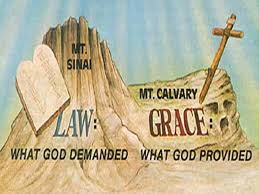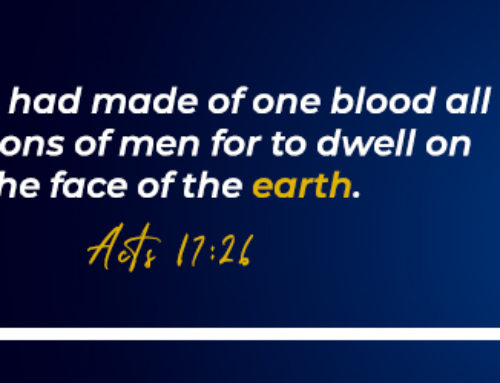In our homes there are laws. There are rules established by our local governments. Then there are state laws. Here in the United States of America, as in all other civilized countries, all citizens are obligated to abide by the supreme law of the land called the Constitution. All other laws of the land are subject to that law. The violation thereof can result in serious consequences that may affect the entire population.
No rational person would suggest that the laws governing our temporal lives might be broken without suffering the consequences of their violation. Laws and consequences are the foundations of human civilization. It has been that way from creation. It has continued so throughout the history of mankind and will remain thus as long as we exist.
Should we do away with, or otherwise eradicate those laws, the result would be chaotic. Now those are only man made laws. It follows, therefore, that the God of the universe must also have laws by which his subjects, mankind, are bound to abide. How much more serious then, can be the consequences for the violation of God’s law? The violation of God’s law is called sin. The consequence of which is death. God told our first parents in the Garden of Eden: “Of every tree of the garden thou mayest freely eat: But of the tree of the knowledge of good and evil, thou shalt not eat of it: for in the day that thou eatest thereof thou shalt surely die” (Genesis 2:16-17). The apostle Paul reaffirmed that tenet: “the wages of sin is death” (Romans 6:23). And what is sin? It is what Adam and Eve did in the Garden of Eden, i.e. disobeying God’s law. The apostle John makes it plain: “Whosoever commits sin, transgress (break) the law; for sin is the transgression of the law” (1 John 3:4). But which Law?
Of all the laws given to man by God, none is of higher value than the Ten Commandments. This law encompasses all other laws and forms the foundation of God’s government. It is the supreme law by which God intends all men to live. It is God’s constitution. It reads thus:
(1) Thou shall have no other god before me.
(2) Thou shall not make unto thee any graven image of an y likeness of anything that is in heaven above, or that is in the earth beneath, or that is in the water under the earth: thou shall not bow down thyself to them, nor serve them: for I the Lord thy God am a jealous God visiting the iniquity of the fathers upon the children unto the third and fourth generation of them that hate me and showing mercy unto thousands of them love me and keep my commandments.
(3) Thou shall not take the name of the Lord thy god in vain; for the Lord will not hold him guiltless that take His name in vain.
(4) Remember the Sabbath day to keep it holy. Six days shall thou labor, and do all thy work: but the seventh day is the Sabbath of the Lord Thy God: in it thou shall not do any work: thou nor thy son, nor thy daughter, nor thy manservant, nor thy maidservant, nor thy cattle, nor thy stranger that is within thy gates. For in six days The Lord made heaven and earth, the sea and all that in them is, and rested on the seventh day: wherefore the Lord blessed the seventh day and hallowed it.
(5) Honor thy father and thy mother: that thy days may be long upon the land, which the Lord, thy God giveth thee.
(6) Thou shall not kill.
(7) Thou shall not commit adultery.
(8) Thou shall not steal.
(9) Thou shall not bear false witness against thy neighbor.
(10) Thou shall not covet thy neighbor’s house. Thou shall not covet thy neighbor’s wife: nor his manservant, nor his maidservant, nor his ox, nor his ass, nor anything that is thy neighbor’s (Exodus 20:3-17).
Question is, ‘which one of these don’t we have to obey once we accept Jesus Christ as our Lord and Savior from sin?’
Of such importance is the Ten Commandment law of God, that He trusted no one to write them down. Lest there be any misunderstanding or misinterpretation, the Scripture records that God wrote them on tables of stone with His own finger. Moses records, “And he gave unto Moses, when he had made an end of communing with him upon mount Sinai, two tables of testimony, tables of stone, written with the finger of God” (Exodus 31:18). I thank God that nowhere in His word do we find Him annulling any part of his law. I praise Him even more for grace. Paul concludes, “But the gift of God is eternal life through Christ Jesus, our Lord” (Romans 6:23). Here Paul presents the antidote for breaking God’s law and suffering the consequences thereof. That’s grace…Jesus Christ paying the penalty for our transgression. He explains, “But God commendeth his love toward us, in that, while we were yet sinners, Christ died for us” (Romans 5:8). But, the learned apostle affirms, “Do we then make void the law through faith? God forbid: yea, we establish the law” (Romans 3:31).
Clearly, Paul is not giving permission to sin because of God’s grace to us, through Our Lord and Savior Jesus Christ. Rather, he is calling the Christian to a higher standard of accountability. He is pointing us to keep the law, by the grace of God, and because of our love for Him. As Christians, our determination should be not to sin, i.e. breaking any one of God’s commandments. However, because of our fallen human nature, we do, from time to time, succumb to temptation and sin. But, thanks to God for grace. Because of that grace so freely and abundantly given to us, we should strive to reflect the character of God. His character is exemplified by His holy law, the Ten Commandments. The apostle John presents true grace to us. He counsels, “My little children, these things write I unto you, that ye sin not. And if any man sin, we have an advocate with the Father, Jesus Christ the righteous. And He is the propitiation for our sins: and not for our sins only, but also for the sins of the whole world” (1 John 2: 1,2). Being saved by grace means the turning away from sin and walking in righteousness. It means stop breaking God’s law and start obeying it. We can obey, by the power of the indwelling of the Holy Spirit, coupled with a willing and submissive heart.
Perhaps, the most misunderstood and misused passage of scripture is this: “For sin shall not have dominion over you: for ye are not under the law, but under grace” (Romans 6:14). Too often, the very next verse is forgotten. Paul continues: “what then? Shall we sin (break the law) because we are not under the law, but under grace? God forbid” (Romans 6:15). Paul asks the same question again, “what shall we say then? Shall we continue in sin (continue to break the law), that grace may abound? (Romans 6:1). Nowhere does Paul give permission to break God’s law because of grace. The law, to which Paul is referring, in each of these cases, is the Ten Commandment law. A correct understanding of what grace is, and how Paul relates to it is necessary for properly comprehending the relationship between law and grace.
Here is an explanation. Biblical grace is a divine endowment bestowed by a Holy God upon sinful man. It is greater than all our sins (Romans 5:20). It is freely and abundantly lavished upon every member of the human family. Grace affords us pardon from our sins. It further empowers us to live without sin. It saves us from the condemnation of sin, which is death. Most importantly, is that which God gives to us that we may have a chance to return to Him. Divine grace is not a license to break God’s law. It is, indeed, the power to keep us from breaking the law, which is sin. It is a free gift given by a Loving God to undeserving man. Grace is the divine influence upon the heart, drawing sinful man ever closer to his Holy Creator. Jesus declared to the woman, caught in adultery, who was about to suffer the consequences of her sin, “Neither do I condemn thee: go and sin no more”(John 8:11). This is the epitome of grace…amazing grace.
Jesus Christ, our Creator, Redeemer and Lawgiver, is the only example we should follow. He kept the law perfectly. We must always endeavor to do likewise. By His grace we can.










Leave A Comment